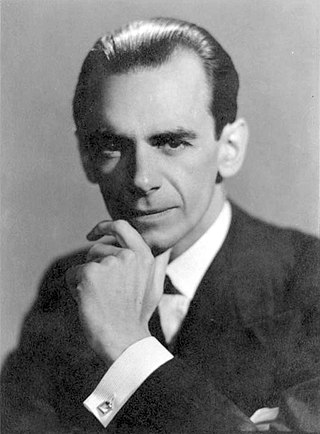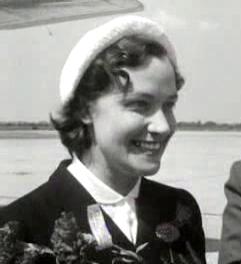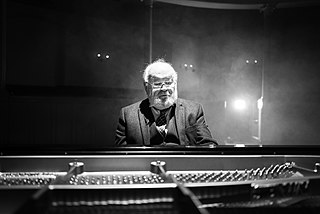
Sir John Barbirolli was a British conductor and cellist. He is remembered above all as conductor of the Hallé Orchestra in Manchester, which he helped save from dissolution in 1943 and conducted for the rest of his life. Earlier in his career he was Arturo Toscanini's successor as music director of the New York Philharmonic, serving from 1936 to 1943. He was also chief conductor of the Houston Symphony from 1961 to 1967, and was a guest conductor of many other orchestras, including the BBC Symphony Orchestra, London Symphony Orchestra, the Philharmonia, the Berlin Philharmonic and the Vienna Philharmonic, with all of which he made recordings.

Roy Galbraith Henderson CBE was a British baritone singer, conductor and teacher.

Sir Harold Malcolm Watts Sargent was an English conductor, organist and composer widely regarded as Britain's leading conductor of choral works. The musical ensembles with which he was associated included the Ballets Russes, the Huddersfield Choral Society, the Royal Choral Society, the D'Oyly Carte Opera Company, and the London Philharmonic, Hallé, Liverpool Philharmonic, BBC Symphony and Royal Philharmonic orchestras. Sargent was held in high esteem by choirs and instrumental soloists, but because of his high standards and a statement that he made in a 1936 interview disputing musicians' rights to tenure, his relationship with orchestral players was often uneasy. Despite this, he was co-founder of the London Philharmonic, was the first conductor of the Liverpool Philharmonic as a full-time ensemble, and played an important part in saving the Royal Philharmonic Orchestra from disbandment in the 1960s.

Kathleen Mary Ferrier was an English contralto singer who achieved an international reputation as a stage, concert and recording artist, with a repertoire extending from folksong and popular ballads to the classical works of Bach, Brahms, Mahler and Elgar. Her death from cancer, at the height of her fame, was a shock to the musical world and particularly to the general public, which was kept in ignorance of the nature of her illness until after her death.

Dame Janet Abbott Baker is an English mezzo-soprano best known as an opera, concert, and lieder singer.

Richard Lewis CBE was an English tenor of Welsh parentage.

Dame Isobel Baillie,, néeIsabella Douglas Baillie, was a Scottish soprano. She made a local success in Manchester, where she was brought up, and in 1923 made a successful London debut. Her career, encouraged by the conductor Sir Hamilton Harty, quickly developed, with breaks in the first years for vocal study in Milan. Baillie's career was almost wholly as a concert singer: she only once acted in an opera production on stage. She was associated above all with oratorio, becoming well known for her many performances in Handel's Messiah, Haydn's The Creation, Mendelssohn's Elijah and the choral works of Elgar.
The Purcell School for Young Musicians is a specialist music school for children, located in the town of Bushey, south Hertfordshire, England, and is the oldest specialist music school in the UK. The school was awarded the UNESCO Mozart Medal in 2003, which was received on behalf of the school by King Charles, who is a patron of the school. Sir Simon Rattle is honorary president of the school. Many of the pupils subsequently study at top conservatories across the country including: the Royal College of Music, the Royal Academy of Music and the Guildhall School of Music and Drama. In 2015, the School became the first Fazioli Pianoforti Centre of Excellence.

David Wilde is an English pianist and composer. As a boy he studied with Solomon and his pupil Franz Reizenstein, who had also studied composition with Hindemith and Vaughan Williams.
George Michael Sinclair Kennedy CBE was an English music critic and author who specialized in classical music. For nearly two decades he was the chief classical music critic for both The Daily Telegraph (1986–2005) and The Sunday Telegraph (1989–2005). A prolific writer, he was the biographer of many composers and musicians, including Vaughan Williams, Elgar, Barbirolli, Mahler, Strauss, Britten, Boult and Walton. Other notable publications include writings on various musical institutions, the editing of music dictionaries as well as numerous articles for The New Grove Dictionary of Music and Musicians and the subsequent Grove Music Online.

The Independent Society of Musicians (ISM) is the UK and Ireland's professional body for musicians representing over 11,000 individuals across all areas of the music industry. The ISM is also a subject association for music education and is an independent non profit-making organisation.

Geoffrey Penwill Parsons AO OBE was an Australian pianist, most particularly notable as an accompanist to singers and instrumentalists. After the retirement of Gerald Moore, he was generally considered the world's finest and most sympathetic accompanist of lieder singers, "elevating the role of the accompanist to new heights with his musicality, authority and quiet strength of playing".

The Hallé is an English symphony orchestra based in Manchester, England. Since 1996, the orchestra has been resident at the Bridgewater Hall in Manchester.

The British National Opera Company presented opera in English in London and on tour in the British provinces between 1922 and 1929. It was founded in December 1921 by singers and instrumentalists from Sir Thomas Beecham's Beecham Opera Company (1915–1920), which was disbanded when financial problems over buying The Bedford Estate forced Beecham to withdraw from the music scene for a short period. The new venture was financed by the issue of 40,000 preference shares at £1 each. Among the musicians who met at the inaugural meeting of the new enterprise at the Queen's Hall were Sir Alexander Mackenzie, Sir Charles Stanford, Harry Plunket Greene, Walter Hyde, Aylmer Buesst and Sir Henry Hadow. The new company bought the entire assets of the Beecham company, comprising the scenery, costumes, scores, instruments and performing rights for 48 operas.

George Vern Barnett was an Australian organist, choir master and accompanist. He was an important figure in the musical and cultural life of Sydney for many years in the early twentieth century.
This is a summary of 1953 in music in the United Kingdom, including the official charts from that year.

Edgar Kendall Taylor CBE, FRCM, Hon FRAM was a British pianist, who had an international career as a solo concert pianist. In the United Kingdom, he was well known for his concerts, which were broadcast on the BBC. He was also known for his recitals and broadcasts to the troops during World War II through the Entertainments National Service Association. He also had a career as a teacher and pedagogue.
The Walter Willson Cobbett Medal is awarded annually by the Worshipful Company of Musicians "in recognition of services to Chamber Music". It was established in 1924 and endowed with £50 by Walter Willson Cobbett (1847–1937), an amateur violinist and expert on chamber music who went on to serve as the company's master in 1928–29. Cobbett had previously instigated the Cobbett Competition for chamber music, and later was the primary author of the two volume Cobbett's Cyclopedic Survey of Chamber Music, first published in 1929.
Joseph Middleton is a British classical pianist and lied accompanist.













